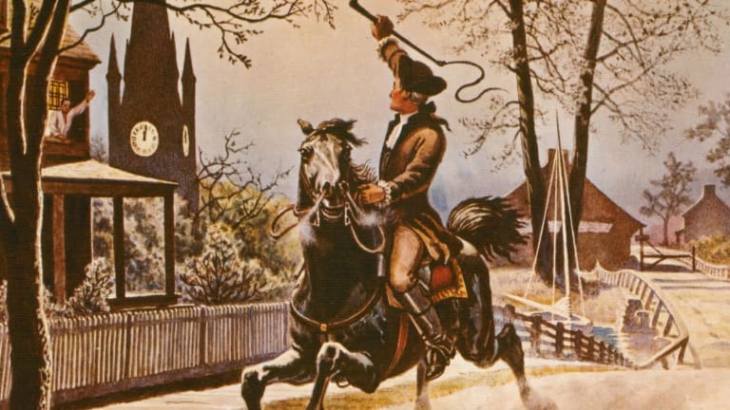Does “the 18th of April” ring any bells for you?
Ten years ago, exactly, in my graduate seminar in education leadership (full of would-be superintendents working on PhDs at my well-respected research one university), our professor entered the room, struck a dramatic pose and said…
“On the 18th of April” (long pause, class attentive)
“In seventy-five” (long pause, dead silence)
“What?” (gray-haired Prof scans the room)
In a small voice, I say,
“Hardly a man is now alive
who remembers that famous day and year.”
(another pause, Professor smiling, nodding)
I clear my throat and say…
“It’s the one that begins ‘Listen my children…'”
(blank faces)
“and you shall hear…”
(still nada)
“of the midnight ride…”
(a couple of people are getting it now)
“of…?”
(muttered voice from the class) “umm, Paul Revere?”
Prof points to me and says “Don’t answer!” Then he asks: “Who’s the poet?”
When nobody–not one of the 20-odd people in the room– could answer, or would even try, he lets me tell the class. Longfellow.
“When did you learn that?” he asks.
Fifth grade. And I only know an abridged version. But still.
One if by land, two if by sea–and I on the opposite shore shall be…
I learned “O Captain, My Captain” (speaking of anniversaries) in 8th grade.
And the prologue to “Romeo and Juliet” in high school. Still with me, along with memorized King James scripture, lots of Cummings, Dickinson and Frost and an embarrassingly large cache of song lyrics.
Why aren’t we using poetry to teach history?
Well, two roads diverged in a yellow wood…
And we chose easily measured standardized test questions.


My kids attended a public school where, beginning in seventh grade, once each term students were required to declaim, from memory, in front of their class, a piece of writing. It was a factor in the term’s grade. The selection had to be approved beforehand and was required to be of a certain length to be acceptable. It was also necessary to provide a context for the piece before presenting. Those who were judged to perform the best were sent to school-wide declamations, with the finalists performing in the auditorium at a student assembly. It was also required in their foreign language classes.
It’s an excellent tool for memorizing, vocabulary development and also for public speaking. All of them are now at ease in their careers speaking from notes or extemporaneously. The tradition of declamation continues at their former school.
LikeLiked by 1 person
Interestingly, I’ve been getting a little pushback from folks who want to point out that Paul Revere’s ride is a folk fable, like much of what American kids learned in elementary school about our history. Actually, I think memorizing bits of conventional history provides a great tool for such deeper analysis, for deconstructing the conventional narrative–with the memorization part providing the benefits you mention–vocabulary development, public speaking, the beauty of language, and so on.
Thanks for your comment.
LikeLiked by 1 person
Listen my children and you shall hear of the abuse perpetuated every year by politicians of every stripe in hopes that you will bear their boring tripe. One if by reading and two if by math, they don’t worry about the aftermath of unending testing and lost recess, don’t challenge them, they know best
LikeLiked by 3 people
I was in sixth grade when I had to memorize not only the Gettysburg Address, which wasn’t too bad, but the Declaration of Independence (ugh). Neither of them are completely with me any longer. But I do still have “tomorrow, and tomorrow, and tomorrow,” which was required in senior English. And I’ve picked up the Act I Prologue from Romeo and Juliet along the way, though I don’t recall that one being required.
LikeLike